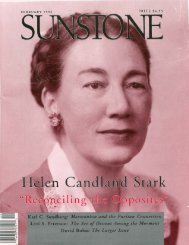Download Entire Issue PDF - Sunstone Magazine
Download Entire Issue PDF - Sunstone Magazine
Download Entire Issue PDF - Sunstone Magazine
Create successful ePaper yourself
Turn your PDF publications into a flip-book with our unique Google optimized e-Paper software.
S U N S T O N E<br />
Testimony of an atheist<br />
YOUR OLD WOMEN SHALL<br />
DREAM DREAMS<br />
By Sara Burlingame<br />
INTRODUCTION<br />
FOLLOWING IS A VERSION OF A PRESENTATION<br />
I gave at the 2010 Salt Lake <strong>Sunstone</strong> Symposium.<br />
Before I started, I called two women—Kynthia and<br />
Beth—to the podium and handed each a goblet filled with<br />
small squares of chocolate. Then I enjoined them to pass<br />
this “sacrament.”<br />
As they made their way down the aisles, presenting the<br />
goblet to each audience member, I intoned: “As the cup is<br />
passed, please take a piece of chocolate, but don’t eat it<br />
yet.”<br />
When everyone held a piece of chocolate, I continued,<br />
Now that we have received this sacrament, I would<br />
like you all to lick or nibble a portion—not the entirety—of<br />
your chocolate. Brothers and Sisters, this<br />
chocolate is your intellectual integrity. Someday<br />
you are going to meet someone of another faith<br />
whom you will love very much. When that day<br />
comes, you’ll want to have a whole and<br />
unbesmirched chocolate to offer them. We can refrain<br />
from “tainting” our chocolate by refusing to<br />
slander people who believe differently than we do.<br />
I hope this has been a meaningful and deeply impressive<br />
lesson for you all even though it has almost<br />
nothing to do with the talk I’ve prepared. I am<br />
counting on the old adage, “There’s nothing that<br />
Latter-day Saints love more than an object lesson—<br />
relevant or not.”<br />
SARA BURLINGAME has been a Montessori<br />
teacher, Eurotrash, zine publisher, artisan bread<br />
baker, mother, partner, and blogger at fMh. She<br />
makes her living as the Director of Religious<br />
Education at the Unitarian Universalist Church of<br />
Cheyenne, but her passion is haunting the Wyoming legislature,<br />
whether Cheney is in town or not.<br />
That “opening exercise” seemed a cheeky way for me, a<br />
non-Mormon, to show that my understanding of Mormon<br />
culture went beyond denim skirts and green Jell-O. But how<br />
then do I explain the sadness that washed over me when I<br />
saw Kynthia and Beth cradling their goblets, solemnly<br />
moving down the aisles with their offering? I wondered how<br />
long those two had been waiting for someone to call their<br />
names; to ask them to come to the front of a congregation; to<br />
entrust the objects of ritual into their hands.<br />
With that sadness came a clear vision—one I am grateful<br />
to own, even if doing so means I have to give up my atheist<br />
card. As those two women stood across from each other in<br />
the Sheraton Hotel conference room, reflected endlessly in<br />
the echoing mirrors, I also saw a host of faithful, stagnant<br />
women waiting patiently behind them, fanning out across<br />
time. I wanted to call to those women, bound in the wings,<br />
to take their rightful place—or at the very least, I wanted to<br />
proclaim, “This sacrament is real, too. We are still a people<br />
gathered, and you have served us. That must be holy.”<br />
But what those women really wanted—to stand in front<br />
of their people and be recognized as beloved daughters of<br />
God, equal to their brothers, was clearly not in my power to<br />
give them. And that was heartbreaking. Ritual is important. I<br />
was foolish to forget that the act of ritual contains its own<br />
rules and that no person can control the results.<br />
A year later, I still don’t know how I feel about that vision.<br />
I am content to have witnessed and learned something<br />
from it, even if that something was only a deeper understanding<br />
of the particular pain that exclusion carries.<br />
THE SPEECH<br />
IWANT TO talk about faith and personal narrative today,<br />
and a good way to start is to tell my own story. I was<br />
raised Bahá’í by my parents, but as a teenager, I experimented<br />
with Christianity, Buddhism, New Age–ism and—<br />
perhaps most memorably for those around me—a very<br />
vocal Goddess worship. By age 16, I’d found what felt like<br />
my true calling and remained a staunch adherent to<br />
PAGE 66 OCTOBER 2011

















